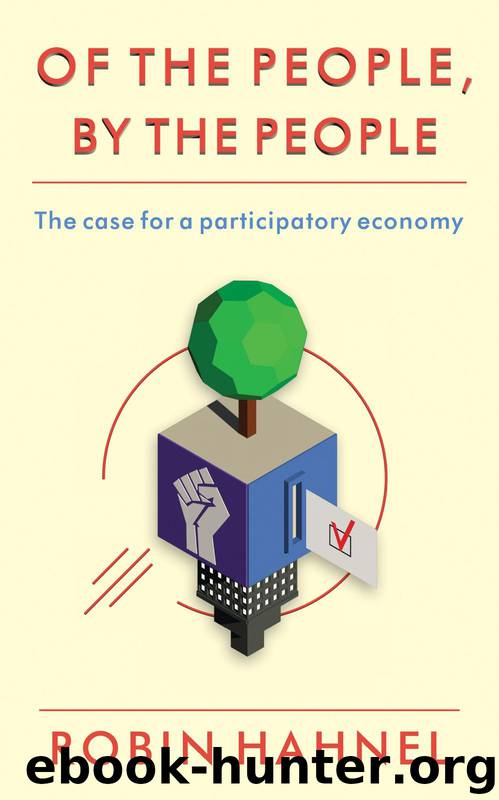Of the People, By the People by Robin Hahnel

Author:Robin Hahnel [Hahnel, Robin]
Language: eng
Format: mobi
ISBN: 9780983059776
Published: 2012-11-07T16:00:00+00:00
CHAPTER THIRTEEN
CONSUMPTION
Consumer Councils
Every individual, family, or living unit belongs to a neighborhood consumption council. Each neighborhood council belongs to a federation of neighborhood councils the size of a precinct. Each precinct federation belongs to a city ward, or rural county federation. Each ward belongs to a city consumption council, each city and county council belongs to a state council, and each state council belongs to the national federation of consumption councils. The major purpose for “nesting” consumer councils into ever larger federations is to allow for the fact that different kinds of consumption affect different numbers of people. Some decisions affect only local residents, while others affect all who live in a city, county, state, or the entire country. Failure to arrange for all those affected by consumption activities to participate in choosing them not only implies a loss of self-management, but, if the preferences of some who are affected by a choice are disregarded or misrepresented, it also implies a loss of efficiency as well.
One of the serious liabilities of market systems is their systematic failure to allow for expression of desires for social consumption on an equal footing with desires for private consumption. In fact, a precise way to describe what markets do is they minimize the transaction costs of a buyer and seller arranging a deal between them while maximizing the transaction costs of participation for all those other than the buyer and seller who will be affected by the deal struck, usually to the point of disenfranchising them altogether.
In the participatory planning procedure described next chapter every neighborhood consumption council, and every federation of consumption councils submits proposals for what they want to consume. Neighborhood consumption councils aggregate the approved individual consumption requests of all households in the neighborhood, append requests for whatever neighborhood public goods they want, and submit the total list as the neighborhood consumption council’s request in the planning process. Higher level federations of consumer councils simply request whatever public goods are consumed by all those who comprise their membership. Having different levels of consumer federations participate on an equal footing with neighborhood councils in the planning procedure eliminates any bias against collective consumption and in favor of individual consumption in a participatory economy.
Consumption Allowances
As explained last chapter, members of the labor force earn consumption rights based on their effort and sacrifice at work, as judged by their co-workers.1 Those who are not expected to work because they are too young, still in school, disabled, or retired are also awarded consumption rights. How generous the consumption allowances of those excused from the workforce will be is decided democratically by society at large, as is the size of any consumption allowance for someone who is deemed able to work but declines to do so.
A household has a right to consume an amount which costs society an amount equal to the sum of the consumption allowances of all its members. The social cost of consumption requests is calculated by multiplying the amount of any good
Download
This site does not store any files on its server. We only index and link to content provided by other sites. Please contact the content providers to delete copyright contents if any and email us, we'll remove relevant links or contents immediately.
International Integration of the Brazilian Economy by Elias C. Grivoyannis(108912)
The Radium Girls by Kate Moore(12013)
Turbulence by E. J. Noyes(8040)
Nudge - Improving Decisions about Health, Wealth, and Happiness by Thaler Sunstein(7689)
The Black Swan by Nassim Nicholas Taleb(7104)
Rich Dad Poor Dad by Robert T. Kiyosaki(6601)
Pioneering Portfolio Management by David F. Swensen(6283)
Man-made Catastrophes and Risk Information Concealment by Dmitry Chernov & Didier Sornette(6001)
Zero to One by Peter Thiel(5784)
Secrecy World by Jake Bernstein(4739)
Millionaire: The Philanderer, Gambler, and Duelist Who Invented Modern Finance by Janet Gleeson(4462)
The Age of Surveillance Capitalism by Shoshana Zuboff(4274)
Skin in the Game by Nassim Nicholas Taleb(4235)
The Money Culture by Michael Lewis(4196)
Bullshit Jobs by David Graeber(4177)
Skin in the Game: Hidden Asymmetries in Daily Life by Nassim Nicholas Taleb(3987)
The Dhandho Investor by Mohnish Pabrai(3757)
The Wisdom of Finance by Mihir Desai(3727)
Blockchain Basics by Daniel Drescher(3574)
